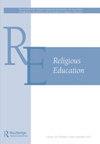Arm in Arm with Adolescent Girls: Educating into the New Creation
IF 0.4
3区 哲学
0 RELIGION
引用次数: 2
Abstract
Emily Peck-McClain offers an ethnographic study of the relationship between Christian teenage girls and several personal and social issues such as body image, sexism, and racism. She then offers a liberation-centric interpretation of the middle section of Paul’s Letter to the Romans (chapters 6–8) as a theological foundation for ministry among this demographic. Peck-McClain argues that girls think complexly about their social and theological locations, but that their thoughts and questions are often silenced in churches because of a prevailing theological paradigm focusing on personal sin, repentance, and righteousness. Against this paradigm, Peck-McClain argues that in Romans 6–8, Paul interprets sin and grace as opposing principles struggling against one another in human lives and societies, rather than as the products of correct or incorrect choices. Interpreting sin and grace as external forces in the world liberates girls from understanding their bodies and choices as the sources of sin, takes the pressure of “being good” off their shoulders, and instead allows them to hope for the ultimate victory of grace over sin and the coming of the new creation. Arm in Arm with Adolescent Girls is a case study in bringing theology to bear on curriculum development and the practice of ministry to young people. The greatest strength of Peck-McClain’s work is her integration of this theoretical framework with ethnographic research, showing that solid theological foundations for youth ministry are necessary because unconsidered theologies will not be capable of answering the complexity of teenage questions and struggles. Teenage girls engage critically and reflexively with issues of faith, morality, body image, sexism, racism, sexuality, and media pressure. Peck-McClain finds a theology capable of meeting these challenges in Paul’s description of a cosmic struggle between sin and grace. In this respect, liberation theology is another important context for Peck-McClain’s work, but her citations reflect a less robust engagement with the theoretical foundations of liberation theology than with contemporary theories of youth ministry. Peck-McClain’s arguments rest on an interpretation of Romans 6-8. She argues against a caricature of Paul which one-sidedly emphasizes personal responsibility for sin and righteousness and advocates for “body/mind dualism” and “self-hatred.” Since dualism and selfhatred are surely realities in many pews, pulpits, and youth groups, Peck-McClain’s appeal for a healthy theology of the body is pastorally wise. However, her argument could reflect fuller engagement with the lively contemporary debate about the meaning of the word “righteousness” in the Pauline epistles, since Peck-McClain’s main exegetical point is that “sin” and “righteousness” have been incorrectly defined by the traditional Protestant soteriology and morality. Peck-McClain does not appeal to the New Perspective on Paul as a source for her critique of “righteousness,” as she could have. She risks unnecessarily losing the goodwill of scholars and other readers who remain committed to a personal concept of sin and righteousness by dismissing their view too quickly, without giving the issue the theoretical treatment it deserves. Nevertheless, Peck-McClain’s interpretation of Romans speaks与少女携手:教育进入新创造
艾米丽·佩克-麦克莱恩对基督教少女与身体形象、性别歧视和种族主义等个人和社会问题之间的关系进行了人种学研究。然后,她对保罗致罗马书的中间部分(6-8章)提供了一个以解放为中心的解释,作为在这个人口群体中事奉的神学基础。佩克-麦克莱恩认为,女孩们会复杂地思考自己的社会和神学位置,但她们的想法和问题往往在教堂里被沉默,因为主流的神学范式专注于个人的罪、悔改和正义。佩克-麦克莱恩认为,在罗马书6-8章中,保罗把罪和恩典解释为人类生活和社会中相互对立的原则,而不是正确或不正确选择的产物。将罪恶和恩典解释为世界上的外力,将女孩从将自己的身体和选择理解为罪恶的来源中解放出来,将“做个好人”的压力从她们的肩上卸下,而让她们希望恩典最终战胜罪恶和新创造的到来。“与少女携手同行”是一个将神学应用于课程发展和青年事工实践的案例研究。佩克-麦克莱恩的作品最大的优点是她将这一理论框架与民族志研究相结合,表明青年事工的坚实神学基础是必要的,因为未经考虑的神学将无法回答青少年问题和斗争的复杂性。十几岁的女孩对信仰、道德、身体形象、性别歧视、种族主义、性取向和媒体压力等问题进行批判和反思。佩克-麦克莱恩在保罗对罪与恩典之间的宇宙斗争的描述中发现了一种能够应对这些挑战的神学。在这方面,解放神学是佩克-麦克莱恩作品的另一个重要背景,但她的引用反映了对解放神学理论基础的关注,而不是对当代青年事工理论的关注。佩克-麦克莱恩的论点基于对罗马书6-8章的解释。她反对对保罗的漫画,这种漫画片面地强调个人对罪和义的责任,并提倡“身心二元论”和“自我憎恨”。既然二元论和自我憎恨在许多教堂、讲坛和青年团体中确实存在,佩克-麦克莱恩呼吁健康的身体神学是牧师的智慧。然而,她的论点可以更充分地反映出当代关于保罗书信中“义”一词含义的激烈辩论,因为佩克-麦克莱恩的主要训诂观点是,“罪”和“义”被传统的新教救世论和道德错误地定义了。佩克-麦克莱恩并没有把保罗的新观点作为她批判“义”的来源,而她本可以这样做。她冒着不必要地失去学者和其他读者的善意的风险,这些人仍然致力于个人的罪恶和正义的概念,因为她太快地驳回了他们的观点,而没有给予这个问题应有的理论处理。不过,佩克-麦克莱恩对罗马书的解释说明了
本文章由计算机程序翻译,如有差异,请以英文原文为准。
求助全文
约1分钟内获得全文
求助全文
来源期刊

RELIGIOUS EDUCATION
RELIGION-
CiteScore
0.90
自引率
28.60%
发文量
46
期刊介绍:
Religious Education, the journal of the Religious Education Association: An Association of Professors, Practitioners, and Researchers in Religious Education, offers an interfaith forum for exploring religious identity, formation, and education in faith communities, academic disciplines and institutions, and public life and the global community.
 求助内容:
求助内容: 应助结果提醒方式:
应助结果提醒方式:


